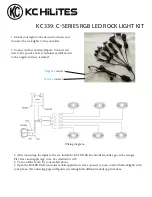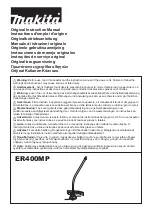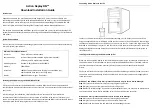
POWDP9021
EN
Copyright © 2020 VARO
P a g e
|
4
www.varo.com
▪
If devices are provided for the connection of dust extraction and collection facilities, ensure
these are connected and properly used. Use of these devices can reduce dust related
hazards.
5.4
Power tool use and care
▪
Do not force the power tool. Use the correct power tool for your application. The correct
power tool will do the job better and safer at the rate for which it was designed.
▪
Do not use the power tool if the switch does not turn it on and off. Any power tool that
cannot be controlled with the switch is dangerous and must be repaired.
▪
Disconnect the plug from the power source before making any adjustments, changing
accessories, or storing power tools. Such preventive safety measures reduce the risk of
starting the power tool accidentally.
▪
Store idle power tools out of the reach of children and do not allow persons unfamiliar with
the power tool or these instructions to operate the power tool. Power tools are dangerous
in the hands of untrained users.
▪
Maintain power tools. Check for misalignment or sticking of moving parts, breakage of
parts and any other condition that may affect the power tool’s operation. If damaged, have
the power tool repaired before use. Many accidents are caused by poorly maintained
power tools.
▪
Keep cutting tools sharp and clean. Properly maintained cutting tools with sharp cutting
edges are less likely to stick and are easier to control.
▪
Use the power tool, accessories and tool bits etc., in accordance with these instructions
and in the manner intended for the particular type of power tool, taking into account the
working conditions and the work to be performed. Use of the power tool for operations
different from intended could lead to a hazardous situation.
5.5
Service
▪
Have your power tool serviced by a qualified person using only identical replacement
parts. This will ensure that the safety of the power tool is maintained.
6 ADDITIONAL SAFETY INSTRUCTIONS FOR BATTERIES AND
CHARGERS
6.1
Batteries
▪
Never attempt to open for any reason.
▪
Do not store in locations where the temperature may exceed 40 °C.
▪
Charge only at ambient temperatures between 4 °C and 40 °C.
▪
Store your batteries in a cool dry place (5 °C-20 °C). Never store batteries in discharged
state.
▪
It is better for Li-ion batteries to discharge and reload them regularly (at least 4 times a
year). The ideal charge for long-term storage of your Li-ion battery is 40% of capacity.
▪
When disposing of batteries, follow the instructions given in the section
“Protecting the
environment”.
▪
Do not cause short circuits. If connection is made between the positive (+) and negative (-)
terminal directly or via accidental contact with metallic objects, the battery is short circuited
and an intense current will flow causing heat generation which may lead to casing rupture
or fire.
▪
Do not heat. If batteries are heated to above 100 °C, sealing and insulating separators
and other polymer components may be damaged resulting in electrolyte leakage and/or
internal short circuiting leading to heat generation causing rupture or file. Moreover do not
dispose of the batteries in fire, explosion and/or intense burning may result.
▪
Under extreme conditions, battery leakage may occur. When you notice liquid on the
battery, proceed as follows:
−
Carefully wipe the liquid off using a cloth. Avoid skin contact.
























